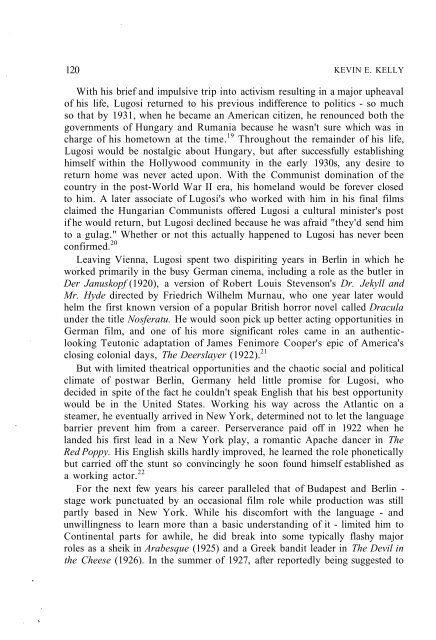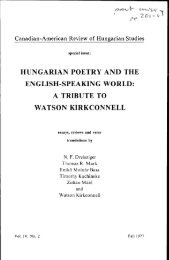120 KEVIN E. KELLYWith his brief and impulsive trip into activism resulting in a major upheavalof his life, Lugosi returned to his previous indifference to politics - so muchso that by 1931, when he became an American citizen, he renounced both thegovernments of Hungary and Rumania because he wasn't sure which was incharge of his hometown at the time. 19 Throughout the remainder of his life,Lugosi would be nostalgic about Hungary, but after successfully establishinghimself within the Hollywood community in the early 1930s, any desire toreturn home was never acted upon. With the Communist domination of thecountry in the post-World War II era, his homeland would be forever closedto him. A later associate of Lugosi's who worked with him in his final filmsclaimed the Hungarian Communists offered Lugosi a cultural minister's postif he would return, but Lugosi declined because he was afraid "they'd send himto a gulag." Whether or not this actually happened to Lugosi has never beenconfirmed. 20Leaving Vienna, Lugosi spent two dispiriting years in Berlin in which heworked primarily in the busy German cinema, including a role as the butler inDer Januskopf (1920), a version of Robert Louis Stevenson's Dr. Jekyll andMr. Hyde directed by Friedrich Wilhelm Murnau, who one year later wouldhelm the first known version of a popular British horror novel called Draculaunder the title <strong>No</strong>sferatu. He would soon pick up better acting opportunities inGerman film, and one of his more significant roles came in an authenticlookingTeutonic adaptation of James Fenimore Cooper's epic of America'sclosing colonial days, The Deerslayer (1922). 21But with limited theatrical opportunities and the chaotic social and politicalclimate of postwar Berlin, Germany held little promise for Lugosi, whodecided in spite of the fact he couldn't speak English that his best opportunitywould be in the United States. Working his way across the Atlantic on asteamer, he eventually arrived in New York, determined not to let the languagebarrier prevent him from a career. Perserverance paid off in 1922 when helanded his first lead in a New York play, a romantic Apache dancer in TheRed Poppy. His English skills hardly improved, he learned the role phoneticallybut carried off the stunt so convincingly he soon found himself established asa working actor. 22For the next few years his career paralleled that of Budapest and Berlin -stage work punctuated by an occasional film role while production was stillpartly based in New York. While his discomfort with the language - andunwillingness to learn more than a basic understanding of it - limited him toContinental parts for awhile, he did break into some typically flashy majorroles as a sheik in Arabesque (1925) and a Greek bandit leader in The Devil inthe Cheese (1926). In the summer of 1927, after reportedly being suggested to
LUGOSI IN HOLLYWOOD 121producer Horace Liveright, he read for the role of Dracula in Liveright'supcoming production of the London stage hit. 23In spite of the notoriety the title inspires when heard, the novel Dracula,published in 1897, was never a financial bonanza for its author, theatricalmanager and thriller novelist Bram Stoker (1847-1912). 24 It did, however,remain continually in print, and it was only after some convincing that Britishregional stage entrepreneur Hamilton Deane convinced Stoker's widow tosanction a dramatic version. The aforementioned <strong>No</strong>sferatu - widely considereda masterpiece of silent cinema - had enraged Mrs. Stoker, not so muchbecause the film turned the renamed Dracula into a metaphor for pestilenceand destruction, but because the film's producers, including Murnau, ignoredobtaining the book's rights from her. 25Stoker's original work, a rambling, verbose and hopelessly Victorian effort,dealt with the arrival in England of an aristocratic vampire, an Anglicizationof the Hungarian word wampyr, describing an "undead" creature that lived bynight off the blood of the living, his attempts to infect the novel's leadingcharacters, and his subsequent destruction by them and an all-knowing Dutchexpert on the occult, Professor Van Helsing.The vampire had been a fixture of western literature and theater since theearly 19th century, but no one work, aside from J. Sheridan LeFanu's famednovella Carmilla (1871), defined the vampire in the public mind as Dracula.While the majority of the novel's background came from research and his ownimagination, Stoker did base his character in part on the notorious Wallachianvoivode Vlad Tepes (1431-76), whose relentless bloodletting during his adultcareer made him not just part of the historical record of Hungary, but a partof local superstition, which for years insisted that his evil influence reached outfrom beyond the grave. Vlad's father was known as Dracul (dragon), and inhis day Vlad became known as Dracula, son of the dragon. This name,coupled with the location of Vlad's atrocities being the far-off, mysterious andexotic-sounding region of Transylvania, became, in Stoker's novel, the identifyingcharacteristics for the most well-known vampire character in literature,the stage and film. 26Deane's version of the novel did profitable business in British regionaltheaters, but he did not attempt a London production until early 1927. Whilecritical reviews were hostile, the public flocked to the play. Among those inthe audience was Liveright, a flamboyant American publisher and producerwho knew Deane's version would be laughed off the boards in New York asit stood, but with revision, could have potential. Purchasing the rights fromDeane and Mrs. Stoker, Liveright assigned London-based playwright andcorrespondent John L. Balderston to the rewrite, which would eventually carry
- Page 1 and 2:
Papers of the Radnóti Memorial Con
- Page 3:
HUNGARIAN STUDIESVOLUME 11, 1996 CO
- Page 8 and 9:
6 GEORGE GÖMÖRIprobably Fürst an
- Page 10 and 11:
8 GEORGE GÖMÖRIof the utmost impo
- Page 12 and 13:
10 GEORGE GÖMÖRIén e földön...
- Page 14 and 15:
12 GEORGE GÖMÖRINotes1. Miklós R
- Page 16 and 17:
14 MIHÁLY SZEGEDY-MASZÁKself alwa
- Page 18 and 19:
16 MIHÁLY SZEGEDY-MASZÁKtype is r
- Page 20 and 21:
18 MIHÁLY SZEGEDY-MASZÁKpose, the
- Page 22 and 23:
20 MIHÁLY SZEGEDY-MASZÁK"Wozu Dic
- Page 24 and 25:
22 MIHÁLY SZEGEDY-MASZÁKand Wilme
- Page 26 and 27:
24 MIHÁLY SZEGEDY-MASZÁKbeen the
- Page 28 and 29:
26 MIHÁLY SZEGEDY-MASZÁKBolond, k
- Page 30 and 31:
28 MIHÁLY SZEGEDY-MASZÁK6. Emery
- Page 32 and 33:
30 ZSUZSANNA OZSVÁTHand breaks as
- Page 34 and 35:
32 ZSUZSANNA OZSVÁTHThe drama echo
- Page 36:
34 ZSUZSANNA OZSVÁTHcontinents at
- Page 39 and 40:
FROM CAIN TO NAHUM 37which, as Csap
- Page 41 and 42:
\FROM CAIN TO NAHUM 39and bears and
- Page 43 and 44:
FROM CAIN TO NAHUM 41who sees what
- Page 45 and 46:
FROM CAIN TO NAHUM 438. "A félelme
- Page 47 and 48:
HELP ME, PASTORAL MUSE:THE VIRGELIA
- Page 49 and 50:
HELP ME, PASTORAL MUSE 47compete! W
- Page 51 and 52:
HELP ME, PASTORAL MUSE 49of a priva
- Page 53 and 54:
HELP ME, PASTORAL MUSE 51Once again
- Page 55 and 56:
HELP ME, PASTORAL MUSE 53Eighth Ecl
- Page 57 and 58:
HELP ME, PASTORAL MUSE 55have that
- Page 59:
HELP ME, PASTORAL MUSE 57Paul de Ma
- Page 62 and 63:
60 SAMUEL J. WILSONWe did, however,
- Page 64 and 65:
62 SAMUEL J. WILSONbeings and contr
- Page 66 and 67:
64 SAMUEL J. WILSONHungarians would
- Page 68 and 69:
66 SAMUEL J. WILSONthe Austrians. G
- Page 70 and 71:
68 SAMUEL J. WILSONnorth-eastern Zi
- Page 72 and 73: 70 SAMUEL J. WILSONoriginally pursu
- Page 74 and 75: 72 SAMUEL J. WILSONGörgey's decisi
- Page 76 and 77: 74 SAMUEL J. WILSONfrom occurring,
- Page 78 and 79: 76 SAMUEL J. WILSON8. Artúr Görge
- Page 80 and 81: 78 STEVEN TÖTÖSY de ZEPETNEKtört
- Page 82 and 83: 80 STEVEN TÖTÖSY de ZEPETNEKThe c
- Page 84 and 85: 82 STEVEN TÖTÖSY de ZEPETNEKher u
- Page 86 and 87: 84 STEVEN TÖTÖSY de ZEPETNEKthe b
- Page 88 and 89: 86 STEVEN TÖTÖSY de ZEPETNEKrooti
- Page 90 and 91: 88 STEVEN TÖTÖSY de ZEPETNEKcriti
- Page 92 and 93: 90 STEVEN TÖTÖSY de ZEPETNEK'My f
- Page 94 and 95: 92 STEVEN TÖTÖSY de ZEPETNEKshe d
- Page 96 and 97: 94 STEVEN TÖTÖSY de ZEPETNEKNotes
- Page 99 and 100: BERLIN ET PARIS DE LAJOS TIHANYIVAL
- Page 101 and 102: BERLIN ET PARIS DE LAJOS TIHANYI 99
- Page 103 and 104: BERLIN ET PARIS DE LAJOS TIHANYI 10
- Page 105 and 106: BERLIN ET PARIS DE LAJOS TIHANYI 10
- Page 107 and 108: BERLIN ET PARIS DE LAJOS TIHANYI 10
- Page 109 and 110: BERLIN ET PARIS DE LAJOS TIHANYI 10
- Page 111 and 112: BERLIN ET PARIS DE LAJOS TIHANYI 10
- Page 113 and 114: BERLIN ET PARIS DE LAJOS TIHANYI 11
- Page 115: BERLIN ET PARIS DE LAJOS TIHANYI 11
- Page 118 and 119: 116 KEVIN E. KELLYfilms Lugosi made
- Page 120 and 121: 118 KEVIN E. KELLYthe provinces, no
- Page 124 and 125: 122 KEVIN E. KELLYboth his and Dean
- Page 126 and 127: 124 KEVIN E. KELLYfollowed it into
- Page 128 and 129: 126 KEVIN E. KELLYvampiric nobleman
- Page 130 and 131: 128 KEVIN E. KELLYThe film also boo
- Page 132 and 133: 130 KEVIN E. KELLYWood remained one
- Page 134 and 135: 132 KEVIN E. KELLYLugosi, convinced
- Page 136 and 137: 134 KEVIN E. KELLY19. Lennig, 112-1
- Page 139 and 140: THE AGON OF IRONY AND SATIREIN GYÖ
- Page 141 and 142: THE AGON OF IRONY AND SATIRE 139poe
- Page 143 and 144: THE AGON OF IRONY AND SATIRE 141tra
- Page 145 and 146: THE AGON OF IRONY AND SATIRE 143fek
- Page 147 and 148: THE AGON OF IRONY AND SATIRE 145ner
- Page 149 and 150: THE AGON OF IRONY AND SATIRE 147whi
- Page 151 and 152: THE AGON OF IRONY AND SATIRE 149mov
- Page 153 and 154: THE AGON OF IRONY AND SATIRE 151for
- Page 155 and 156: THE AGON OF IRONY AND SATIREA harma
- Page 157 and 158: MURDER IN THE MOUNTAINSTranslated b
- Page 159 and 160: MURDER IN THE MOUNTAINS 157"Afraid?
- Page 161 and 162: MURDER IN THE MOUNTAINS 159Abády,
- Page 163 and 164: MURDER IN THE MOUNTAINS 161"The mar
- Page 165 and 166: MURDER IN THE MOUNTAINS 163Bálint
- Page 167 and 168: MURDER IN THE MOUNTAINS 165"That is
- Page 169 and 170: MURDER IN THE MOUNTAINS 167at hand,
- Page 171 and 172: CONTRIBUTORSMiklós BÁNFFYLászló
















